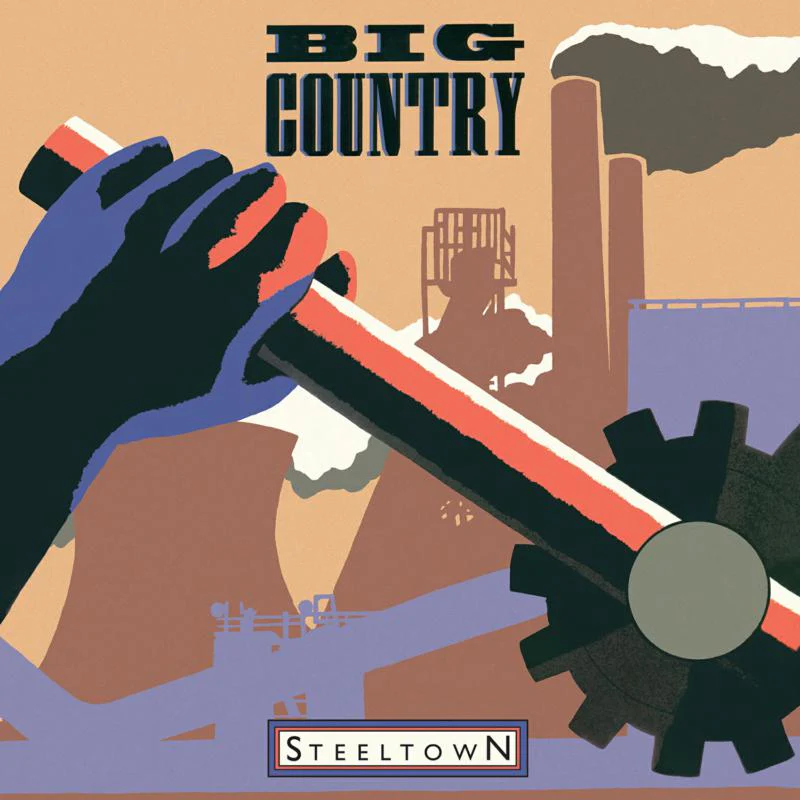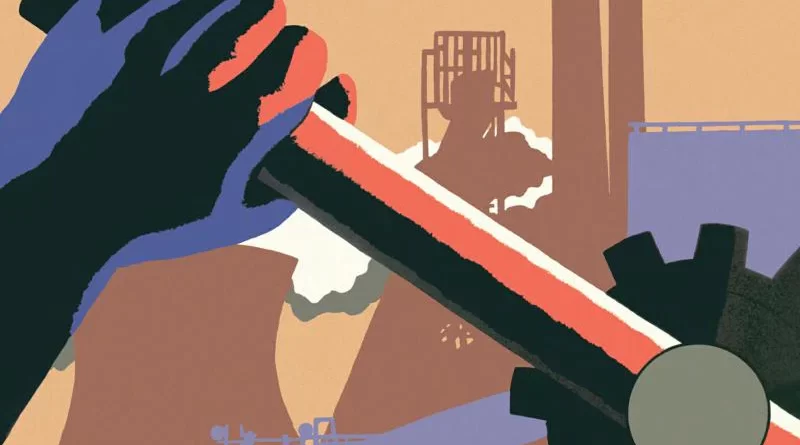HEAVY MUSIC HISTORY: Steeltown – Big Country
Dunfermline, Fife, Scotland – a city that has seen it all. In the modern day, it is Scotland’s major and thriving service centre, but in the past it was known for its textile, coal and limestone industries alongside its complex network eighteenth century railway networks. This industrial setting is the back drop for Steeltown, the second album by Dunfermline natives, BIG COUNTRY. Made up of Stuart Adamson (vocals, guitar), Bruce Watson (guitar) Tony Butler (bass guitar) and Mark Brzezicki (drums) – the band’s classic lineup – BIG COUNTRY shot to fame in the early and mid-1980s and have retained a cult status ever since. Famous for engineering their guitar-driven sound to emulate the sound of bagpipes, fiddles, and other traditional folk instruments.
BIG COUNTRY’s debut album The Crossing was released in July 1983 and reached number 3 in the UK album charts and drew comparisons to Irish rock band THIN LIZZY with its musical style and lyrics. So, there was pressure going into writing and recording of the band’s sophomore album but also plenty of momentum. Recorded at ABBA‘s Polar Studios in Stockholm and produced by Steve Lillywhite (who worked with the likes of U2, ROLLING STONES, SIMPLE MINDS, PETER GABRIEL and THE POUGES to name a few) the album was released on 19 October 1984 in the UK and 29 October 1984, in the United States.
The central themes that occur throughout Steeltown are the misfortunes of Scottish workers during the industrial decline and British politics at the time – Margret Thatcher was Prime Minister when this album was released and the Miners’ Strike started in that year also, so that should tell you everything you need to know. The title track tells the story of Scots went to work at the Stewarts & Lloyds steelworks in the town of Corby, Northamptonshire when it opened in 1935. This was at the height of the Great Depression, but the workers later found themselves unemployed when the steelworks declined in the early 1980s. Alongside thought provoking tracks such as Where the Rose Is Sown, which according to Tim Peacock of Record Collector had an anti-war message “especially resonant in the wake of the Falklands” and East of Eden which Adamson, speaking with Number One magazine in 1984, stated “It’s a questioning song, a song about always having to look for any hope or inspiration.”
This also coincides with Adamson’s more personal songs such as Girl with Grey Eyes being based on his wife Sandra. While his father who was a merchant mariner, is the man who is described as bright and hard as “a bloody edge of sword” in the catchy Tall Ships Go. While BIG COUNTRY’s sound was still as revolutionary, the lyrics has also taken on that revolutionary tone, with Adamson in the liner notes stating that the album has “an unshakeable belief in the integrity of the working man, beset on all sides by the hypocrisy, cynicism and often blatant dishonesty of those in power”. So, with the Bolshevik-esque art adorning the album’s cover to boot, Steeltown was very much a songbook for the working man, and in the four decades since its release it still has a visceral effect on a listeners who have experienced the daily working class hardships and collapse of industry.
As a result of this relatability the album rocked to number one on the UK album charts with singles East of Eden, Where the Rose Is Sown, and Just a Shadow all entering the top 40 at various points. However, it failed to take hold of the same success internationally, especially in North America reaching number 53 in Canada and number 70 on the US Billboard 200. It is speculated that this is a result of the insular lyrical themes mentioned above, American and Canadian audiences struggled to relate to it and this effected sales. Despite this, Fred Schruers of Rolling Stone – the well known American publication – gave BIG COUNTRY a glowing review, stating “Clanging and crackling with energy, this second album from BIG COUNTRY rings natural evolutionary changes on the band’s stirring twin-guitar sound even as it frames still better news: bandleader Stuart Adamson has rapidly matured into a songwriter capable of bringing meticulous craft to his obvious passion.”
It also didn’t hamper the band’s touring schedule too much as they toured the UK, Europe, and to a lesser extent the US both as headliners and in support of bigger name artists as QUEEN and ROGER DALTREY (notable frontman of the THE WHO) throughout 1984 and 1985. BIG COUNTRY even appeared on the 1984 Christmas charity record Do They Know It’s Christmas? for Band Aid alongside PHIL COLLINS, BOB GELDOF, FRANCIS ROSSI and RICK PARFITT of STATUS QUO and many other famous faces.
When it comes to Steeltown as an album, it has a very unique place in the rock world as it shows BIG COUNTRY at their pique and it sings of a time when community really meant something. As Adamson poignantly states in the album’s liner notes “If music is important, it has to come down to emotion. It should be a human thing. Maybe that has something to do with coming from Scotland, where music has always been really close to the heart of the community…”

Steeltown was originally released on October 19th, 1984 via Mercury Records.
Like BIG COUNTRY on Facebook.

